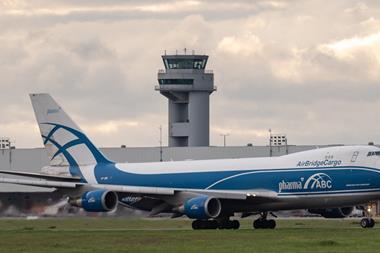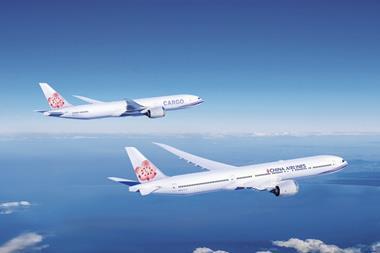Atlas Air Worldwide Holdings (AAWH) has backed the long-term future of the Boeing 747 freighter after the aircraft manufacturer said it could axe production of the iconic aircraft.
Speaking last week after the announcement of the aircraft operator's second-quarter results, AAWH chief executive Bill Flynn backed the B747 saying there were three options for large widebody intercontinental cargo flights: the B747-800, the B747-400 and the B777.
Flynn said he believed the B747 platform had a good long-term useful life because of its nose loading capabilities meaning it can take oversized pieces, unlike the B777.
B747-800s also have a larger weight capacity than B777s as they are able to carry 138 tonnes, compared with 103 tonnes for the B777.
This extra capacity is especially useful at slot constrained airports where it is important to load as much cargo on every flight as possible, he said.
The B777, meanwhile, made sense for long-haul point-to-point flights because of the range it is able to offer. It is also more suitable for lower weight cargo than the B747.
Looking to future aircraft investment, Flynn said decisions on which model to opt for would come down to customer requirements and the market segment Atlas was looking to serve.
But he said while he expected extra B747-800s and B777s to join its operation in the future, it was unlikely it would add extra B747-400s, although -400s were currently enjoying a new “competitive life” at the moment because of “persistently” lower fuel costs.
Atlas chief financial officer Spencer Schwartz added that if Boeing were to end production B747s, it could actually drive the value of the aircraft up because of the potential scarcity value.
The future of the B747 was called into question when Boeing said it could end production as a result of a lack of demand.
In its half-year report, Boeing said: “Lower-than-expected demand for large commercial passenger and freighter aircraft and slower-than-expected growth of global freight traffic have continued to drive market uncertainties, pricing pressures and fewer orders than anticipated.
“As a result, during the second quarter of 2016, we cancelled previous plans to return to a production rate of 1 aircraft per month beginning in 2019.
“We are currently producing at a rate of 1 per month and expect to reduce the rate to 0.5 per month in September 2016.
“We continue to have a number of completed aircraft in inventory as well as unsold production positions and we remain focused on obtaining additional orders and implementing cost-reduction efforts.
“If we are unable to obtain sufficient orders and/or market, production and other risks cannot be mitigated, we could record additional losses that may be material, and it is reasonably possible that we could decide to end production of the 747.”
Boeing said it currently had 32 undelivered 747 aircraft on its books.
During its quarterly results call, Atlas was also questioned by analysts about the return of a B747-8 from an aircraft, crew, maintenance and insurance (ACMI) customer.
Flynn said the return was "as expected" and the aircraft was put back into its charter segment for the time being to cater for demand in that area.
Flynn was confident the aircraft would go back into ACMI operations when the time was right for Atlas to do so.










